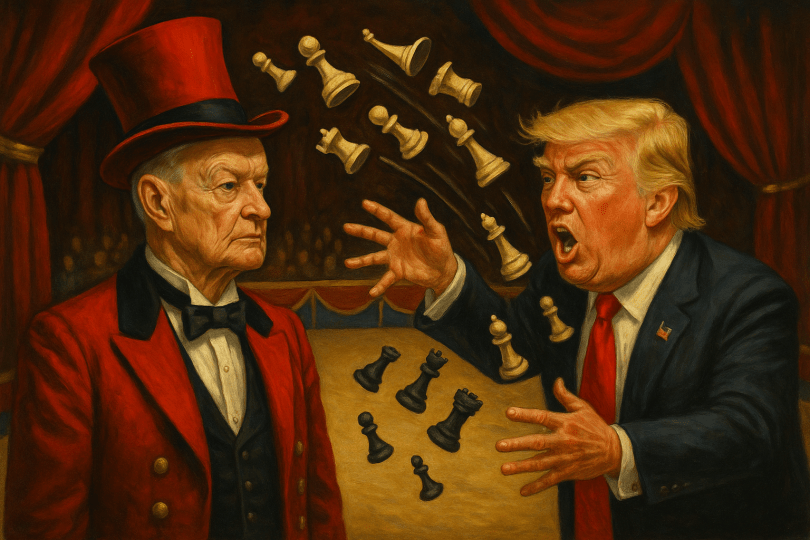
Category: Eurasia
“‘Gen Z’ Mobs Strike Again – Target Mexico”
“Gen Z” Mobs Strike Again – Target Mexico – Evidence So Far of Who is Behind it US NED-funded media like “Animal Politico” and US NED “Democracy Award” winner and former Mexican president/millionaire Vicente Fox are openly promoting the protests “organized” on mainly US-based social media platforms – as per VERIFIED US-engineered color revolutions elsewhere this year including Nepal, and dating all the way back to the so-called “Arab Spring” in 2011. The US destabilizing Mexico amid impending war on Venezuela in South America would reflect Washington’s acceleration toward, not “retreat” from its pursuit of GLOBAL hegemony – Latin America being located on the globe along with Africa, the Middle East, and Eurasia…
Read More »
The CIA has released a new Call of Duty PsyOp /s
Black Ops 7 campaign review: Maybe the worst Call of Duty campaign ever
I had to check and see what country it targeted this time.
The country that represents the Mediterranean city of Avalon in Call of Duty: Black Ops 7 is the fictional nation of Avalon, which is depicted as a city-state and a former crime syndicate based in the Mediterranean region. While it is a fictional location, the city’s in-game storyline and characteristics, particularly its former criminal organization, are inspired by real-world locations like Monaco, and it has historical ties to France and Italy.
Read More »
Video: War on Multipolarism Includes Latin America
War on multipolarism includes Latin America
By Brian Berletic
As the U.S. continues its proxy war with Russia in Ukraine and its escalation with China in the Asia-Pacific, the U.S. is also targeting a number of nations not only across Eurasia, but also far beyond it, including the Latin American nation of Venezuela.
Washington’s “Second Coming” to Asia: Militants, Ports, and Pressure Points

President Trump’s renewed focus on regaining the Bagram Air Base and developing Pakistan’s Pasni Port signals Washington’s attempt to reassert strategic influence in a region increasingly dominated by China, Russia, and Iran.
Pakistan’s Pasni Port, located in Balochistan province, sits at the crossroads of strategic infrastructure and insurgent resistance. The Western-backed Baloch Liberation Army (BLA), active in the region, has long targeted Chinese-financed projects. The BLA maintains ties with both the Pakistan Taliban and ISIS-K—a faction recently linked to recruiting Uygur militants. Separately, U.S. support for Uygur militants predates this trend, with allegations tracing back to the 1970s/1980s. Rep. Perry has claimed that ISIS-K received backing from USAID, adding another layer to the region’s militant entanglements.
This only deepens my suspicion that recapturing Bagram Air Base could serve as a launchpad—not merely for tactical leverage, but to stir Uygur militant resistance against Beijing or pressure China with a second front in the event of a future Pacific conflict.
Sources:
BLA: U.S. Proxies in Balochistan document
ISIS-K & Uygur militants: ISIS has its sights set on a new potential ally—Uyghur jihadi groups
CIA & Uygur militants: US & TERRORISM IN XINJIANG
Uygur militants: *Xinjiang*
USAID & ISIS-K: Rep. Perry reveals what some of us already knew about USAID
Bagram Air Base: Why Does Trump Want U.S. Troops Back in Afghanistan?

Why Does Trump Want U.S. Troops Back in Afghanistan?
“Horrific murder” in Lviv

Verkhovna Rada: “Meeting with Parliament’s interns, Andriy Parubiy and Geoffrey Pyatt,” 2016
“Horrific murder” in Lviv (original)
Read More »Is Turkey on the Chopping Block?
Penny’s post, “Turkey will not receive F-35s unless they eliminate the S-400s,” reminded me of this video that recently appeared in my YouTube feed. The video is from the World Liberty Congress, an organization that advocates for regime change. Turkish opposition figure Oğuzhan Albayrak talks about the failed 2016 coup attempt, the Saturday Mothers, and draws comparisons between Turkey and Iran and China, both of which are in the sights of the U.S. Empire. In his article on the WLC website, he also mentions Ekrem İmamoğlu, another opposition figure with connections to European and U.S. front organizations.
Sources are provided below my unfinished article on Turkey’s significance in The Grand Chessboard.
Read More »Information Pipeline of Krushchev’s Secret Speech

This is just a small part of the research I’ve been working on for quite some time regarding the Soviet Union. My investigation covers various aspects of its history and ideology, as well as the narratives that have influenced how we view this complex entity. By examining primary sources and historical accounts, I’m trying to piece together a more nuanced understanding of the Soviet experience and its lasting effects on global politics.
—Tina Antonis
Read More »

You must be logged in to post a comment.